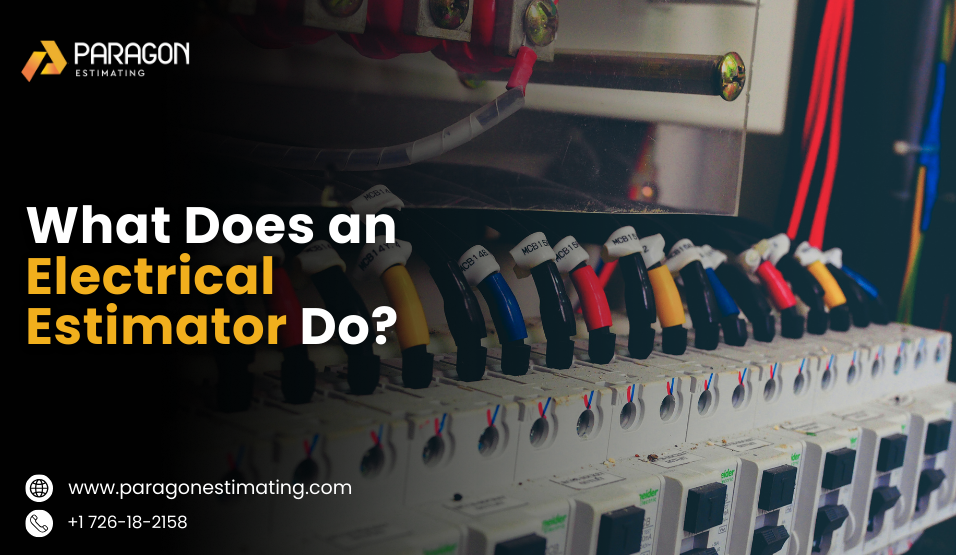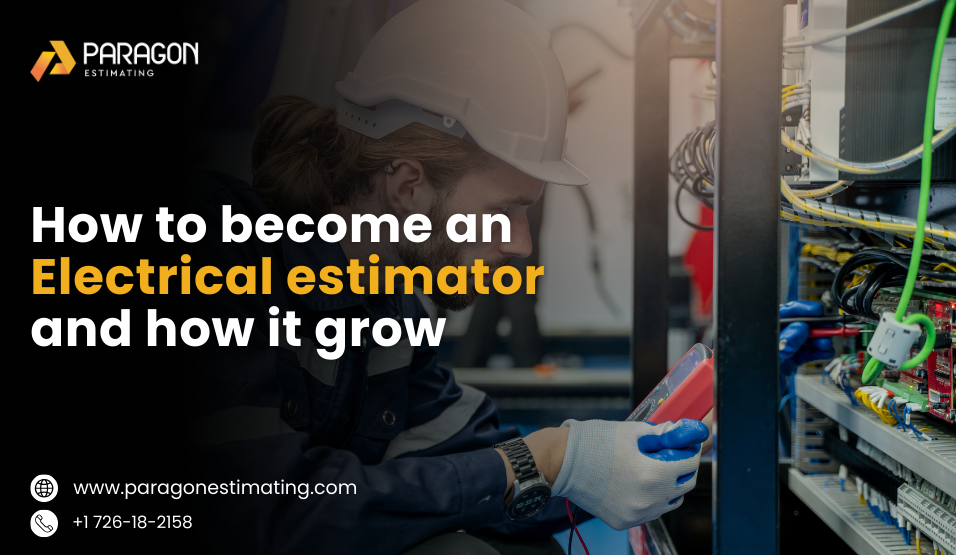Many people nowadays are researching how to become an electrical estimator, but you know why people wanna become professional electrical estimators, because Electricity is the power source of our modern lives, from offices and homes to factories and massive construction projects. Behind every socket and electrical circuit is a professional who analyzes the costs, materials, and labor needed to create it. This professional is an electrical estimator.
In Paragon Estimating, we are experts in providing accurate cost estimates, which empower architects, contractors, and developers all across the U.S. Paragon Estimating’s team of experts ensures that each number we estimate will give you the confidence to take the next step in your plan.

What Does an Electrical Estimator Do?
An electrical estimator serves as the intermediary between project planning and the project’s execution. They analyze blueprints, evaluate costs, and then prepare detailed estimates for electrical work that will ensure projects are completed on budget and on time. Consider them financial architects in the electrical industry. Without accurate estimates, the project could face delays, cost overruns, or even fail.
We at Paragon Estimating assist contractors and subcontractors, as well as construction firms, in creating accurate electrical estimates to get more bids and increase the profitability of their businesses.
How to become an electrical estimator and choose it as a career?
Before we get to the “how,” let’s answer the “why.”
- Demand is high: The construction industry is growing rapidly, and skilled electricians are in high demand across the globe.
- High earning potential: Electrical estimators earn salary levels that are competitive salaries due to their experience.
- Career stability: As long as construction and development continue, there will be a requirement for estimators.
- Opportunities to grow: Numerous estimators become consultants, project managers, or even own their own companies.
How to Become an Electrical Estimator (Step-by-Step Guide)
Understand the Role and Responsibilities
Before you begin your journey, you have to be aware of what an electrical estimator does every Interpreting and reading blueprints
- The calculation of equipment, materials, and the cost of labor
- Preparing bid proposals
- Working with architects and engineers, as well as contractors
- Using specialized estimating software
Gain Relevant Education
There isn’t a single “one-size-fits-all” educational path, but the most common paths comprise
- High school diploma or GED (with solid math abilities)
- Bachelor’s or Associate’s degree in construction engineering or electrical technology, or other related areas
- The training program is focused on electrical systems
Pro Tip: Many successful estimators started as electricians before transitioning into estimating. Experience in the field is the greatest benefit.
Essential Skills for Electrical Estimators
- Mathematics: Analytics Accurate calculations are crucial.
- Pay attention: Attention to mistakes could result in huge financial loss.
- Software Proficiency: Experience with estimation tools such as PlanSwift, Bluebeam, or Accubid.
- Communication: The ability to provide clear estimates to clients and others.
- Timing Management: Estimators frequently must meet tight deadlines.
Get On-the-Job Experience
Practical experience is essential. Begin with entry-level positions like
- Electrical Apprentice
- Estimating assistant
- Junior estimator
The experience of working with experienced estimators can help you understand industry guidelines, standards for pricing, and workflows for projects.
Learn Estimating Software
Modern estimating doesn’t only involve spreadsheets and calculators; it’s about sophisticated software. The top tools in software for electrical estimators are
- PlanSwift
- Accubid
- Bluebeam
- Trimble
The majority of firms that use Paragon Estimating, for example, heavily rely on the tools to ensure speed as well as accuracy and to ensure competitiveness.
Pursue Professional Certification
Credibility can be enhanced by certifications and improve your job chances. A few of the most recommended ones are
- A Certified Professional Estimator (CPE) is a service provided by ASPE
- Electric Estimating Certification Programs at professional or trade schools
- Construction Estimating Courses online as well as offline
Build a Strong Network
Networking can open doors to employment opportunities and mentorship. Attend:
- Trade shows in the construction industry
- Seminars for the industry
- Estimating workshop sizes
Platforms such as LinkedIn are great for connecting with professionals in the industry.
Apply for Estimator Positions or Offer Freelance Services
After you’ve mastered your skills and knowledge, once you’ve gained knowledge and experience, you can:
- As a construction company estimator, you will be an estimator full-time
- Join subcontracting companies
- Offer estimating services for electrical work to many customers
How to become an electrical estimator and overcome their challenges
Every job has its own challenges, and estimating is not an exception.
Common Challenges
- Material costs are rapidly changing.
- Tight deadlines
- Incomplete project drawings
- Communication issues with contractors
How to Overcome
- Keep up-to-date with the latest trends in the market
- Establish strong relationships with vendors
- Use reliable estimating software
- Make sure you invest in ongoing learning
How to become an electrical estimator and how it grows
The process of becoming an electrician isn’t just the end; it’s just the beginning. Through experience, you’ll become:
- Senior Electrical Estimator
- Estimating Manager
- Project Manager
- Independent Estimating Consultant
- Construction Business Owner
The road is open for those who are adamant and dedicated.

Conclusion| How to become an electrical estimator
To become an electrical estimator, you must have the right education, experience, and a lot of dedication. It’s an exciting career that combines technical knowledge with financial expertise, providing an excellent opportunity in the expanding construction sector. Here’s the deal. You don’t have to take this journey on your own. We are Paragon Estimating.
We provide contractors, subcontractors, and builders with professional electrical estimating services that help save time, minimize errors, and boost profits. If you’re a builder or contractor building professional seeking to increase bids and expand your business, call us now for professional electrical estimation services you can count on.
FAQs
How to become an electrical estimator in a short time?
If you have previous electrical experience, it can take up to a year. Without it, getting the degree and training may take between 3 and 5 years.
Do I require a college qualification to become an electrical estimator?
But not always is a degree helpful, but many of the most successful estimators have been educated in trade schools or fieldwork backgrounds.
What is the average salary that an estimator for electrical work earns?
The salary of a person is contingent on their area and experience, but the majority of electrical estimators make between $60,000 and $100,000 annually, with the highest jobs paying more.
How to become an electrical estimator freelancer?
Yes! Numerous estimators are self-employed, assisting contractors who would rather outsource.
How could Paragon Estimating help electrical contractors?
We offer outsourced electrical estimation services that are speedy, reliable, precise, and cost-effective, helping contractors get more bids without the expense of hiring an internal team.


